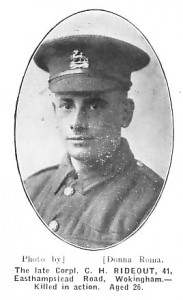 Charles Rideout. Died 25th September 1915
Charles Rideout. Died 25th September 1915
Charles was born in 1889 in Brighton, Sussex to father, Charles and mother, Annie. He was the first born and had five siblings, two brothers and three sisters. By the age of 21, Charles had become a harness maker. His parents lived on the Easthampstead Road in the 1911 census and his father was absent, probably due to his work as a coachman. However, it is strange also that three of the children are also missing that night.
Charles joined the 8th Battalion of the Royal Berkshire Regiment around 1914 and was soon on his way to France. Charles became a Corporal and knew things might turn out badly for him. Mrs Edna Goatley, the Wokingham local historian tells us:
“The Rideout laddie is in a photograph I should have, when the shop under me was a harness maker, he worked there before being called up. I was homehelp to his two sisters, they died over 40 years ago, they talked of the last words he said to them were ”look after Mum & Dad, because I won’t be back”. He was going back to the front line and knew of his chances of making it home again”.
Charles was killed on the 25th September 1915, during the Battle of Loos. It was a bloody battle and the attack of the 25th was the bloodiest. Corporal Read of Henley describes the morning wait: “It was awful. Never shall I forget it! I can well remember looking at my watch about five minutes before we had to leap out of our trenches. Those remaining minutes seemed like years but they had an ending. The whistles sounded all along the line and over we went to meet the awful fire of the Germans”
Loos saw the first use of gas. A sergeant of the 8th recounted later: “On the Saturday the order was given to release the gas. Unfortunately there was not sufficient wind to carry it to the enemy trenches and a number of our men suffered considerably. About 20 minutes was allowed for the gas to settle and then the order was given for the advance”. Unfortunately the wind changed direction and the gas began to drift back across the 1st Division trenches. One of the 10th Glosters, Pte W Jennings, reported “The gas caused a lot of trouble and men were lying in the trench bottom foaming at the mouth”.
The Times:-‘This division [1st] as it proved had an exceptionally hard task for the
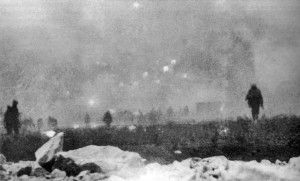
This remarkable photo was taken on the day of Charles’ death. It reflects the diary reports describing the awful weather, gas and smoke of the battlefield. Covering often large, treacherous areas of no mans land and carrying heavy packs, the men were instructed to walk at a steady pace.
enemy’s trenches were protected by masses of concealed barbed-wire which could not properly be observed by our artillery officers and which in consequence could only be subjected to indirect fire. The result was that while First Brigade with the 8th Royal Berks on the left was able to penetrate without any perceptible check as far as the outskirts of Hulluch and to capture some gun positions on the way the second brigade was hung up by uncut wire to the south of lone tree’.
The Berkshire boys found their Prussian enemy to be a physically intimidating sight. To some of the Berkshires it seemed they were fighting giants. Private F O Steward of Newbury wrote: “They were the Prussian Guards we were dealing with and I can tell you some of us looked a little small against them. By 10 o’clock we had every one of their first set of trenches and soon afterwards the order came to advance. We took the first line of their second set alright and I went up with the second line to take their support trenches. Just as we were getting busy with our ‘toothpicks’ a bullet hit me in the right thigh, passing straight through and I toppled over like a shot rabbit”.
By 8 am, the third line had been won after attack and counter attack that early morning. Amongst the confusion of the gas, smoke and appalling weather, the Berkshires were winning positions and taking prisoners.
The German counter attack was not far away, however. By mid afternoon, the Berkshire’s numbers had been cut by half. It was by now a case of attack and counter attack. Private Bucknall of Windsor wrote: “It was terrible seeing one’s pals falling all around us crying for help. Some of the wounded being dressed in our lines were blown to atoms by a shell. The roar of our guns massed behind our lines, the shells bursting and a huge mine of ours seemed to throw the ground from under our feet. Great masses were flung high into the air and blew that part of their line to smithereens”.
These early gains were soon lost and the Battle of Loos, the first time the new army of volunteers had seen action, was overall, a failure. The British had lost some 60,000 men and the Royal Berks themselves lost nearly 500 men; half the battalion. However, the volunteers had acquitted themselves well. Haig’s predecessor Rawlinson described the action of the Berks: “I can assure you no more brilliant feat of arms has been performed by any body of men during the present war, and I am proud to have such regiments under my command.”
We do not know of the exact circumstances of Charles’ loss on this day and through all the carnage of the day, it is probably better this way.
His loss was particularly hard on the Wokingham community; he played such an active part in it. From ‘St. Paul’s Wokingham Early 20th Century Parish Magazine Extracts’ provided by local historian Jim Bell:
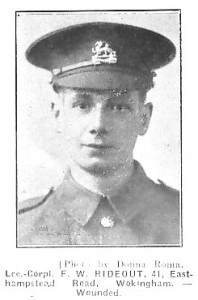 ‘KILLED IN ACTION—–The loss of Corpl. Charles Rideout 8th Berks Regiment, who gave his life in the Service of his Country was felt with sincere sorrow amongst us. He was one of the Bell ringers of St. Paul’s Church, and also a member of the Wokingham Town Band, A muffled peel was rung at the Sunday following the news of his death’.
‘KILLED IN ACTION—–The loss of Corpl. Charles Rideout 8th Berks Regiment, who gave his life in the Service of his Country was felt with sincere sorrow amongst us. He was one of the Bell ringers of St. Paul’s Church, and also a member of the Wokingham Town Band, A muffled peel was rung at the Sunday following the news of his death’.
According to an article in the Reading Mercury of 9th October 1915, “Corporal Rideout was an enthusiastic cricketer and footballer also a member of the Wokingham Town band and a St Paul’s bellringer. He has a brother Frank serving in the 8th Royal Berkshire Regt.”
For more information click on Battle of Loos
Name: RIDEOUT, CHARLES HENRY
Nationality: United Kingdom
Rank: Corporal
Regiment/Service: Royal Berkshire Regiment Unit Text: “B” Coy. 8th Bn.
Age: 25 Date of Death: 25/09/1915
Service No: 13604
Additional information: Son of Charles and Annie Rideout, of 41, Easthampstead Rd., Wokingham, Berks.
Grave/Memorial Reference: Panel 93 to 95. Memorial: LOOS MEMORIAL
41 Easthampstead Road, Wokingham, Berkshire

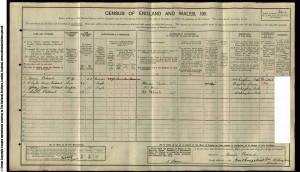
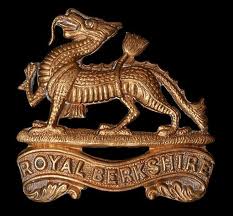
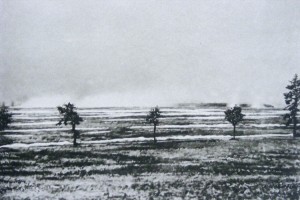
Hello, I am a Rideout from Wisconsin, USA. I am researching our names / family history (we know very little about the name, as my Grandpa, a Rideout, left my Grandma when my Dad was very young and we were to ‘never’ talk about him) Well, I want to find out about him and wondering if you could help in any way. I’ve copied a piece of your website where I found some info about a Charles Rideout:
Service Record
Name: RIDEOUT, CHARLES HENRY
Nationality: United Kingdom
Rank: Corporal
Regiment/Service: Royal Berkshire Regiment Unit Text: “B” Coy. 8th Bn.
Age: 25 Date of Death: 25/09/1915
Service No: 13604
Additional information: Son of Charles and Annie Rideout, of 41, Easthampstead Rd., Wokingham, Berks.
Grave/Memorial Reference: Panel 93 to 95. Memorial: LOOS MEMORIAL
Known Residence(s)
41 Easthampstead Road, Wokingham, Berkshire
Thank you!
Jeff Rideout
Oconomowoc, WI, USA
Hi Jeffrey, do you have any details of the family? I’ll help where I can if you can provide any names. We have a family tree which you can access and has information on it which might be of assistance. Let me know if you would like to see it.
Kind regrds, Mike Churcher